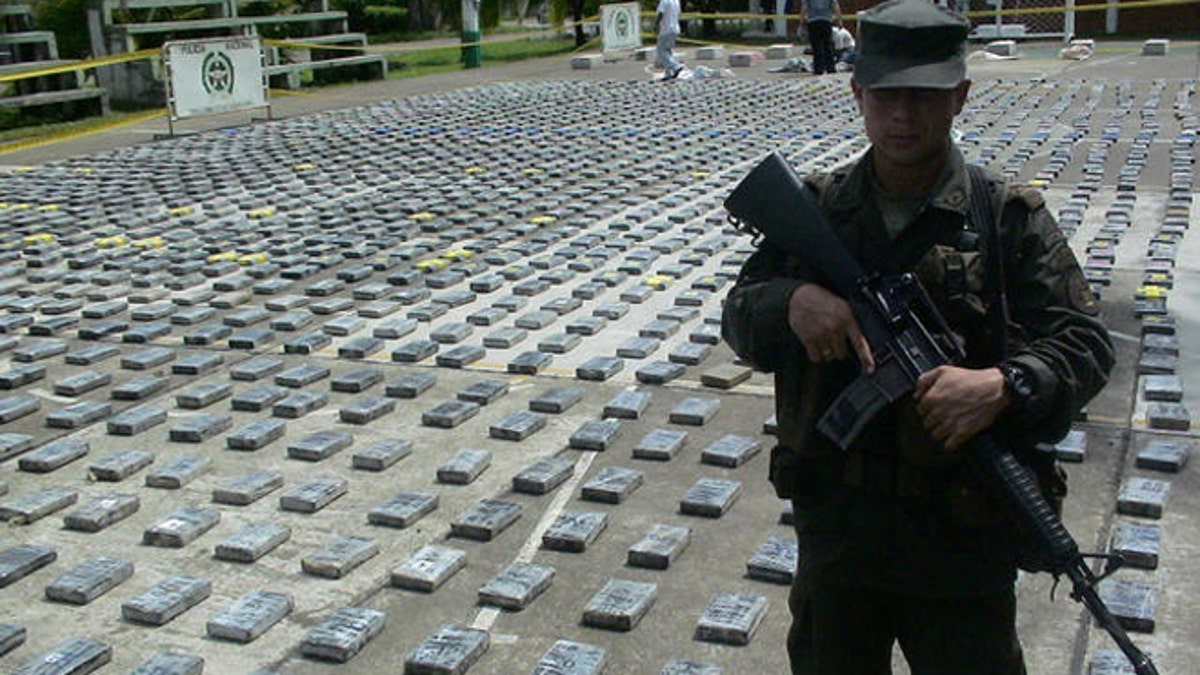
Anti-narcotics police officer guards packages of cocaine, totaling 2.9 tons, seized during a raid at a lab in the rural area of Necocli, in the norther Colombian Caribe coast, Colombia on Monday, June 26, 2006.. (AP Photo/Luis Benavides)
As Mexico’s drug cartels expand their reach beyond Latin America and the United States into Europe, Asia, and Australia, traffickers in Argentina and Brazil have begun looking toward the Middle East Gulf States as a new spot to haul their illicit goods.
Security experts estimate that around 75 percent of all the drugs seized in Qatar come from South America and that the new amounts of wealth pouring into countries like Qatar, the United Arab Emirates and Kuwait have lured drug traffickers to the tightly watched region.
“It’s a very small amount that they have seized in Qatar but we can see from recent activity that Qatar is a new route for drug traffickers from Brazil and Argentina, among other countries, who are using the route to expand their illicit trade in the Gulf region,” said Johan Obdola, president of the Vancouver-based International Organization for Security and Intelligence (IOSI). “If you mention Dubai and Kuwait to anyone in the underworld, people say it’s money. And where there is money, there is opportunity for criminal activity.”
According to a security source speaking to the Argentinean newspaper La Nación, the new route to the Gulf states has “exploded.” Last September there were six cases of attempted drug smuggling from an airport near Buenos Aires to the Qatari capital of Doha and Obdola believes that the amount of smugglers captured in Qatar – 50 last year – is just "the tip of the iceberg."
South American traffickers are taking the risk of bringing their products to the Gulf states because the profit is much greater in that region than in the United States. According to La Nación, the price of a kilogram of cocaine in Qatar is $90,000 – about three times the price it would go for in the U.S.
Despite the cash incentive to traffic drugs to the Gulf states, the countries have some of the harshest anti-drug laws in the world.
The UAE has the longest list of banned substances in the world, which include many commonly available drugs such as codeine and many well-known anti-depressants, and a Qatari court recently sentenced two men to death for drug smuggling.
“Legislation enacted in January 1996 imposes the death sentence for convicted drug traffickers,” the U.S. State Department wrote on its website about the UAE. “Since January 2006, possession of even trace amounts of illegal drugs has resulted in lengthy prison sentences for foreign citizens transiting the UAE.”
The recent effort by Latin American traffickers to move their product to countries other than the U.S. has been mainly based on the rising popularity of drugs like cocaine and MDMA in European nations and the high costs these substances fetch outside the U.S.
A 10-year investigation by Italian authorities last year revealed ties between Italian groups and Mexican drug traffickers to move shipments of cocaine across the Atlantic Ocean.
The U.S. Drug Enforcement Agency (DEA) recently announced documented links between Mexican cartels and criminal groups in Mozambique, the Democratic Republic of the Congo, Ghana, and Nigeria. The Sinaloa Cartel is also known to have ties not only in Europe but throughout Latin America, Africa, Asia and Australia, where a booming trade has developed in the country’s cities.
"The U.S. is not the only game in town," said Rusty Payne, a DEA spokesman, adding that tougher tactics from both the Mexican and U.S. governments have led Mexican cartels to look elsewhere.
"Europe is crazy now with coke," Payne told Fox News Latino last year.
Follow us on twitter.com/foxnewslatino
Like us at facebook.com/foxnewslatino




















